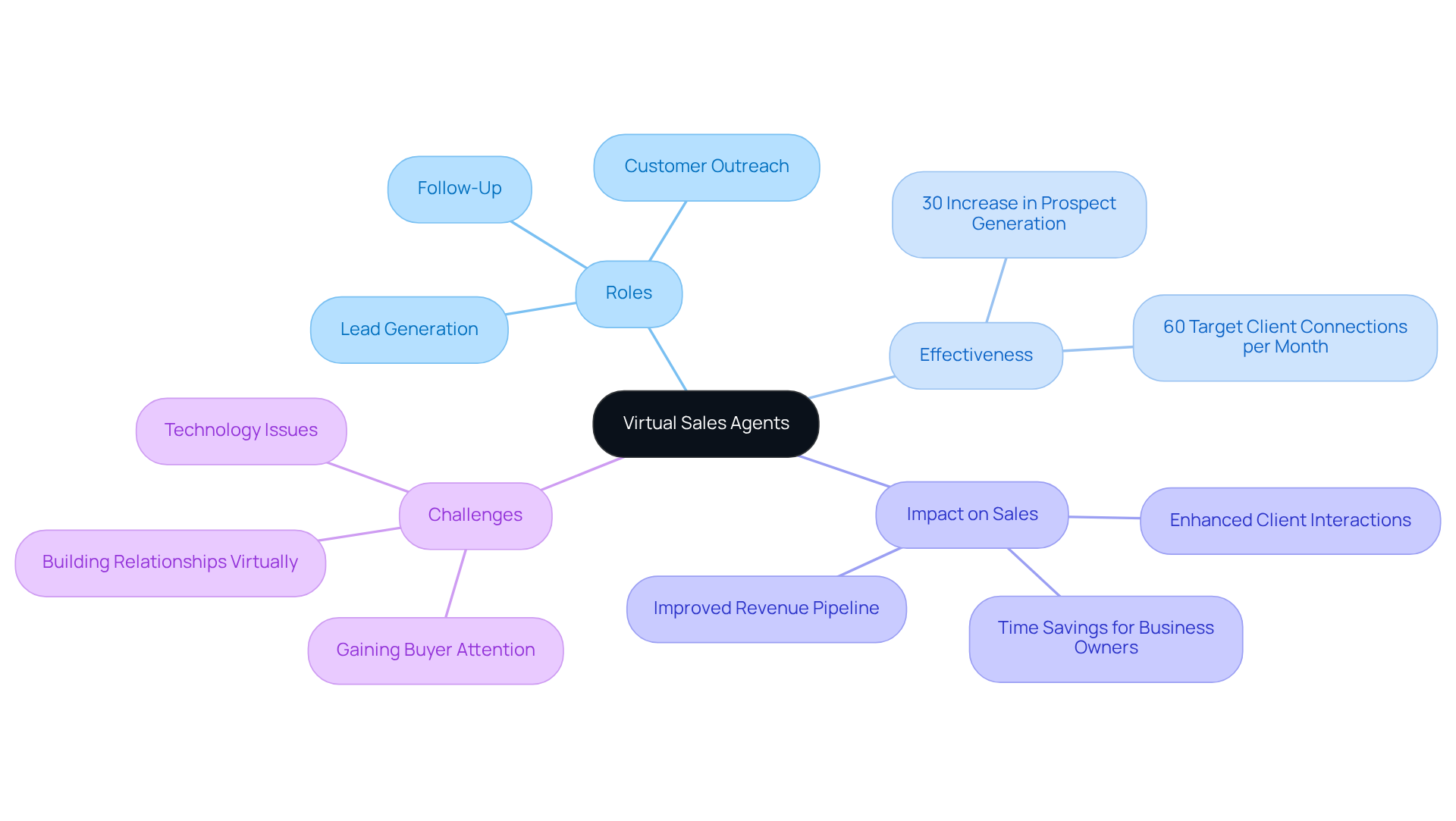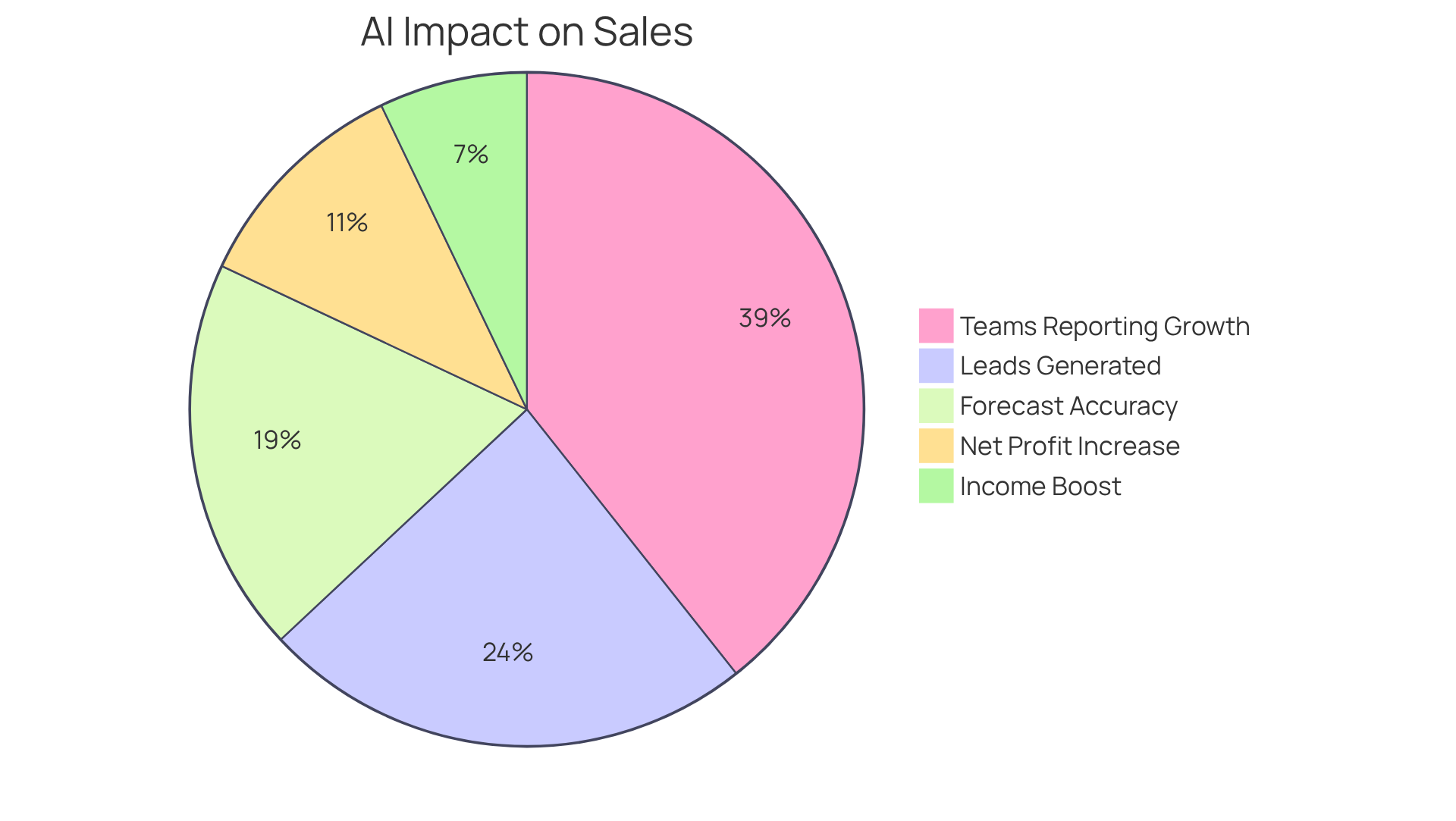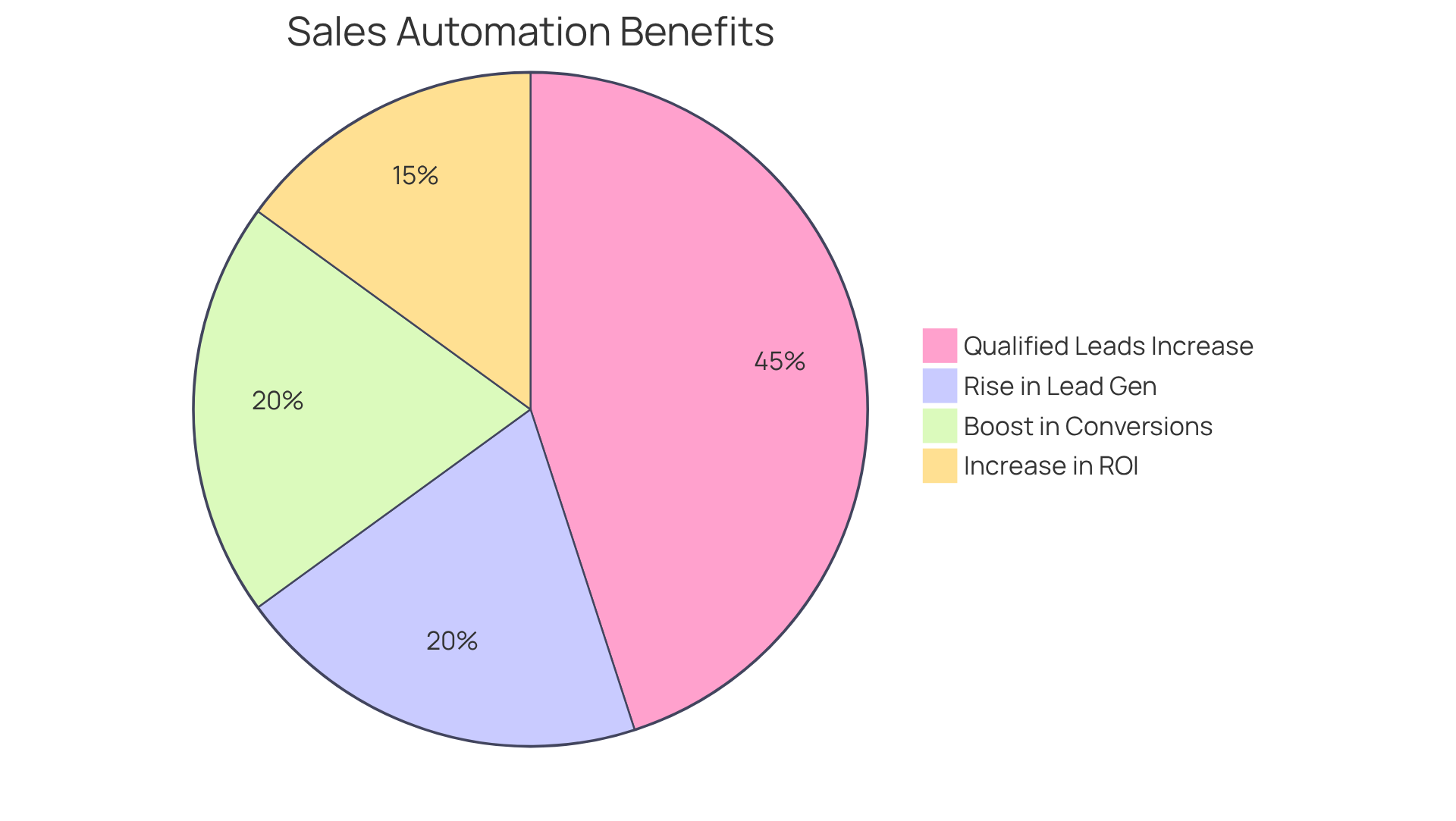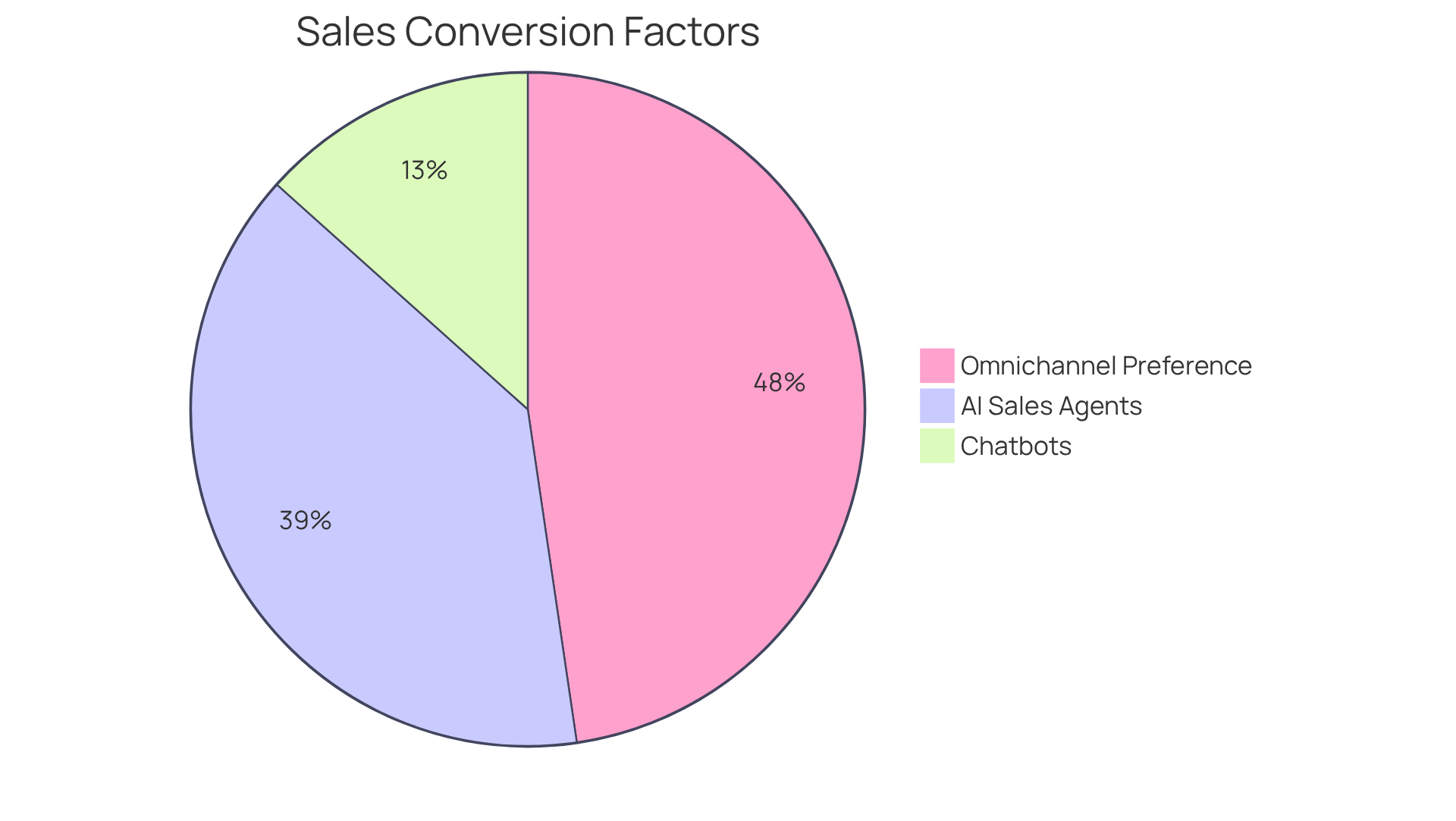Overview
Imagine having a remote expert by your side, guiding you through the complexities of sales. A virtual sales agent is just that—a compassionate solution designed to assist small businesses like yours in navigating sales processes. By automating essential tasks such as lead generation and customer outreach, these agents not only enhance efficiency but also foster stronger client engagement.
Consider how your business could benefit from this support. Many small enterprises have discovered that utilizing virtual sales agents leads to significant improvements in prospect generation effectiveness and conversion rates. This demonstrates their critical role in helping you compete in today’s digital marketplace, where every advantage counts.
We understand your challenges, and embracing technology like this can empower you to focus on what truly matters—building relationships with your clients. Together, we can achieve success in a competitive landscape. Why not explore how a virtual sales agent could transform your sales strategy today?
Introduction
In a world where digital interactions dominate the marketplace, we understand that small businesses face unique challenges. The emergence of virtual sales agents has the potential to transform how you approach sales. These innovative representatives leverage technology to streamline processes, enhance lead generation, and foster meaningful customer relationships, all while saving valuable time and resources.
As you strive to adapt to this evolving landscape, you may wonder: how can you effectively integrate virtual sales agents into your strategies to not only survive but thrive in an increasingly competitive environment? Together, we can explore these possibilities.
Defining Virtual Sales Agents: Key Concepts and Functions
An online sales representative serves as a remote expert or software solution, assisting businesses in their selling processes by performing essential tasks like lead generation, customer outreach, and follow-up communications. Unlike conventional representatives, these virtual sales agents utilize technology to enhance their efficiency and effectiveness. They can operate as independent contractors or as part of a larger sales team, utilizing digital tools to connect with prospects and manage transactions seamlessly. This role is becoming increasingly vital for small enterprises, which often lack the resources for a complete sales force, enabling them to compete successfully in today’s digital marketplace.
But the roles of digital representatives extend beyond mere outreach; they play a crucial part in enhancing prospect generation initiatives. Businesses that employ digital assistants for commerce have reported a remarkable 30% increase in prospect generation effectiveness. By automating routine tasks, these tools liberate valuable time for small business owners, allowing them to focus on strategic growth initiatives. Moreover, incorporating a virtual sales agent into business processes has been shown to enhance interactions with prospective clients, as they can provide tailored communication approaches that resonate with the audience's unique needs and preferences.
Wayy.ai enhances this process by offering features such as a one-click sales strategy and targeted outreach, along with daily email updates that deliver key metrics on engagement. These updates include insights on how many prospects were contacted, who expressed interest, and the conversion rate and its improvement over time. This data-driven approach empowers small business owners to monitor their revenue performance effectively and make informed decisions. The impact of online representatives on lead generation is significant. For instance, companies utilizing these agents can expect to create over 60 target client connections each month, significantly bolstering their revenue pipeline without the burden of manual efforts. This efficiency is especially crucial in today’s fast-paced environment, where 91% of sellers find it challenging to capture and maintain buyer attention virtually. As Marcus Sheridan wisely noted, online transactions enable greater frequency and speed in customer interactions, making them an essential resource for small enterprises striving to succeed in a competitive landscape. Furthermore, it's important to recognize that 88% of sellers find relationship-building nearly impossible, underscoring the need for effective communication and relationship-building strategies in the online selling context.

The Evolution of Virtual Sales Agents: From Traditional Roles to AI Integration
The role of virtual sales agents has undergone a remarkable transformation over the years. Initially, revenue relied heavily on face-to-face interactions, but with the rise of the internet and digital communication tools, a shift toward remote transaction capabilities became essential. Today, the integration of artificial intelligence is reshaping this role, enabling agents to automate repetitive tasks, analyze customer data, and personalize outreach efforts effectively.
This evolution is significant for small business owners: organizations leveraging AI in their revenue processes experience a 23% increase in net profit margins and a 15% boost in income. Imagine the possibilities! AI-powered sales teams generate over 50% more leads and appointments compared to traditional methods. Additionally, 83% of revenue teams using AI reported growth in the past year, compared to just 66% of teams not employing AI. Companies that incorporate AI into their forecasting have seen their accuracy improve by 40%.
Consequently, the use of virtual sales agents has become vital to modern business strategies, reflecting a broader trend toward efficiency and data-informed decision-making. Industry leaders emphasize that AI not only enhances productivity but also significantly improves customer interactions. In fact, 97% of revenue leaders affirm that AI notably increases team efficiency by automating administrative and routine tasks. This makes AI an invaluable asset for small businesses striving to thrive in a competitive landscape.
Looking ahead, the remote sales representatives market is projected to reach a valuation of $50 billion by 2025, underscoring the growing importance of this role. Together, we can navigate these changes and harness the power of AI to achieve success in your business journey.

Key Characteristics of Virtual Sales Agents: Automation, Personalization, and Efficiency
A virtual sales agent is here to help you automate tasks, personalize interactions, and enhance overall efficiency. By automating repetitive tasks like prospect qualification and follow-up messages, these representatives free up your valuable time for more strategic activities. Imagine being able to focus on what truly matters for your business! Personalization is achieved through advanced data analysis, allowing you to customize communications according to your customers' preferences and behaviors.
This collaboration of automation and personalization significantly boosts efficiency. Virtual agents can manage more prospects while ensuring consistent interactions without sacrificing quality. For small enterprises, this is especially beneficial; you can enhance your transaction processes without needing substantial resources. In fact, companies that embrace automation report a 10-20% increase in ROI, and 44% see a significant boost within just six months of implementation.
Furthermore, 80% of companies experience a rise in lead generation when utilizing automation tools. Workflow automation can enhance lead volume by 80%, conversions by 75%, and qualified leads by an astounding 451% in marketing and promotion. Additionally, personalized outreach has proven effective, with 96% of consumers being more likely to make a purchase after receiving a tailored message. This is why virtual sales agents are a revolutionary solution for small enterprises aiming to enhance their revenue performance.
Moreover, 53% of representatives report increased customer satisfaction following the integration of automation in their workflows. It's worth noting that 74% of professionals believe that AI will transform their roles, highlighting the growing importance of these technologies in the business landscape. Considering that 45% of B2B firms cite generating sufficient prospects as their biggest challenge, the role of virtual sales agents becomes increasingly vital in addressing these issues. Together, we can navigate these challenges and achieve success.

The Role of Virtual Sales Agents in Modern Sales: Enhancing Efficiency and Client Engagement
In today's fast-paced business landscape, we understand that virtual sales agents play a vital role in enhancing productivity and fostering meaningful customer interactions. By automating lead generation and follow-up activities, these representatives allow sales teams to devote their energy to building relationships and closing deals. For instance, companies that have embraced AI sales representatives report an impressive 67% increase in conversions. This statistic not only highlights the effectiveness of these tools but also showcases their potential to significantly boost revenue.
Moreover, digital representatives engage with clients through various platforms—like email, social networks, and video calls—ensuring timely and relevant communication. This multi-channel approach not only enhances client engagement but also leads to improved conversion rates. In fact, companies implementing conversational AI chatbots see an average increase of 23% in conversions. It’s worth noting that 82% of shoppers are more inclined to purchase from brands that offer omnichannel conversational experiences. This clearly underscores the importance of adopting such strategies.
As small businesses navigate the challenges of competitive markets, utilizing a virtual sales agent can provide a strategic advantage. Together, we can optimize outreach efforts and nurture meaningful connections with potential clients, paving the way for success. Remember, you’re not alone in this journey; we’re here to support you every step of the way.

Conclusion
Virtual sales agents embody a transformative opportunity for small businesses, offering a way to leverage technology that streamlines sales processes and enhances customer engagement. By integrating these digital representatives into their operations, businesses can significantly improve efficiency, automate routine tasks, and ultimately drive revenue growth. This is crucial for competing effectively in a rapidly evolving marketplace.
The article highlights essential insights into the roles and benefits of virtual sales agents. Their ability to generate leads, personalize communications, and foster meaningful client interactions is invaluable. With statistics showing substantial increases in prospect generation and conversion rates, it becomes clear that these agents are not merely a luxury; they are a necessity for small enterprises aiming to thrive. The evolution of these roles, particularly with the integration of AI, further underscores their importance in modern sales strategies.
As small businesses navigate competitive landscapes, embracing virtual sales agents can provide a strategic edge. The potential for enhanced productivity and improved customer relations is immense. By investing in these innovative solutions, businesses can optimize their sales processes and ensure they are well-equipped to meet the demands of today’s consumers. The future of sales is here, and together we can harness the power of virtual sales agents to pave the way for sustained success. We understand your challenges, and with these tools, you can achieve your goals.
Frequently Asked Questions
What is a virtual sales agent?
A virtual sales agent is an online sales representative or software solution that assists businesses in their selling processes by performing tasks such as lead generation, customer outreach, and follow-up communications.
How do virtual sales agents differ from conventional sales representatives?
Unlike conventional representatives, virtual sales agents utilize technology to enhance their efficiency and effectiveness, operating as independent contractors or part of a larger sales team.
Why are virtual sales agents important for small businesses?
Virtual sales agents are crucial for small enterprises as they often lack the resources for a complete sales force, enabling them to compete successfully in the digital marketplace.
What impact do virtual sales agents have on prospect generation?
Businesses that employ virtual sales agents have reported a 30% increase in prospect generation effectiveness, as these agents automate routine tasks and enhance client interactions.
How does Wayy.ai contribute to the effectiveness of virtual sales agents?
Wayy.ai offers features such as a one-click sales strategy, targeted outreach, and daily email updates that provide key metrics on engagement, helping small business owners monitor revenue performance and make informed decisions.
What are the expected outcomes for companies using virtual sales agents?
Companies utilizing virtual sales agents can expect to create over 60 target client connections each month, significantly enhancing their revenue pipeline without the burden of manual efforts.
What challenges do sellers face in online interactions?
91% of sellers find it challenging to capture and maintain buyer attention virtually, highlighting the importance of effective communication and relationship-building strategies in online selling.
What percentage of sellers find relationship-building difficult?
88% of sellers find relationship-building nearly impossible, underscoring the need for effective strategies in the online selling context.




